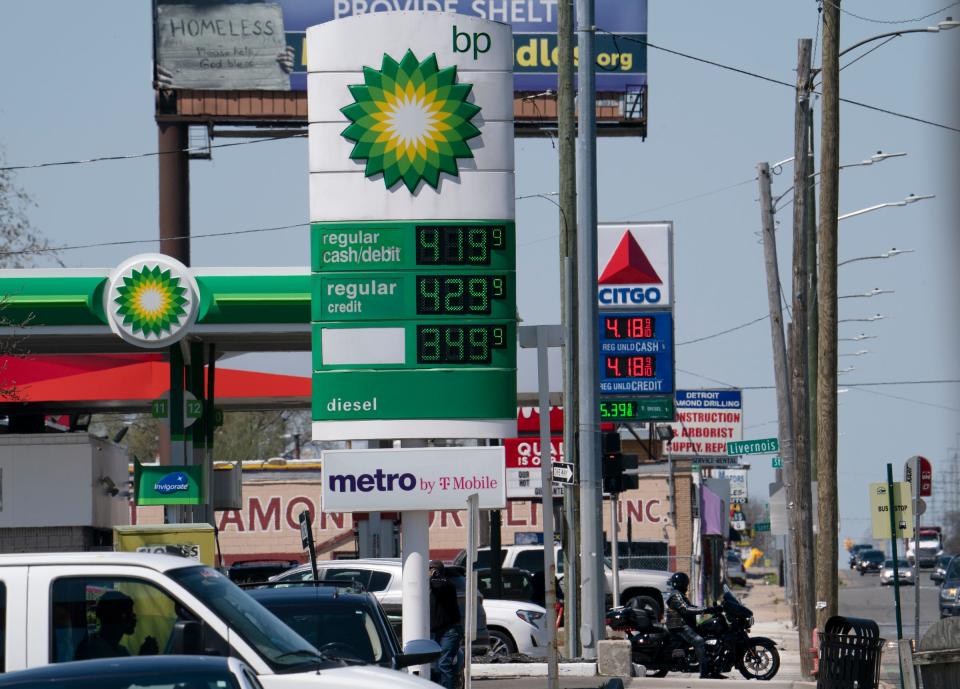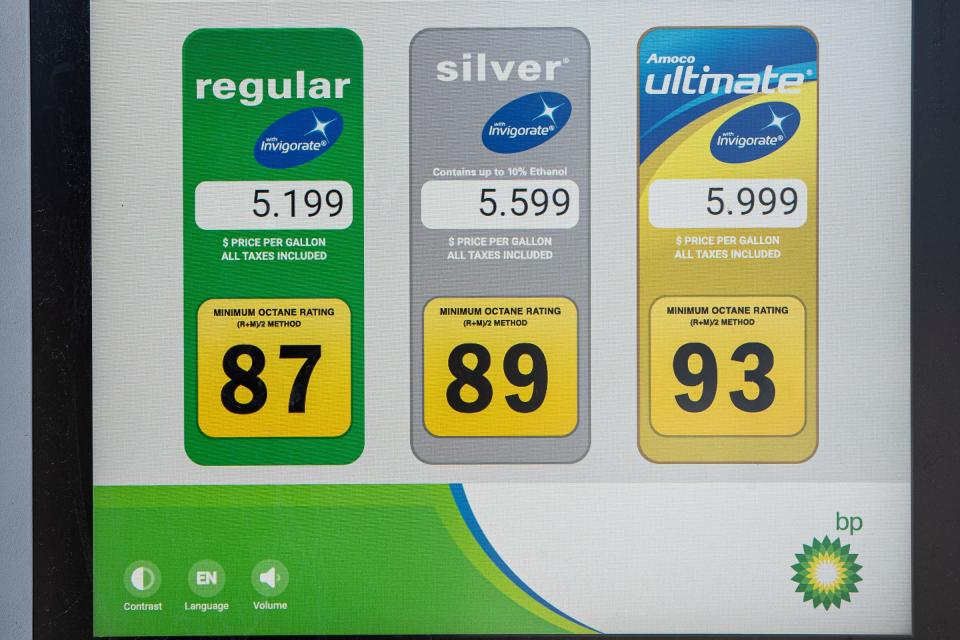IRS pushes standard mileage rate to 62.5 cents per mile for 6 months as gas prices soar
Gas prices at $5 a gallon and much higher have driven even the IRS to take notice.
Beginning July 1, the Internal Revenue Service is pushing up its optional standard mileage rate for business use to 62.5 cents per mile. That's up 4 cents a mile from the current 58.5 cents a mile.
We've not seen the IRS make such a move in the middle of the year since 2011. But then again, we're dealing with scorching hot price hikes for gasoline this summer.
Michigan drivers are paying an average of $5.22 a gallon for regular, up 87.2 cents a gallon from a month ago, according to the latest data from AAA Michigan. The national AAA average is $5.014 a gallon.
This week's average in Michigan is up nearly $2.05 a gallon from a year ago when the average price was $3.17 a gallon.
Gasoline prices soared 48.7% over 12 months through May, according to the latest data from the U.S. Bureau of Labor Statistics.
How the standard mileage rate works
The IRS standard mileage rate is a key benchmark that's used by the federal government and many businesses to reimburse their employees for their out-of-pocket mileage expenses.
While commonly called the mileage rate, it isn't designed to just reflect what it's costing to fill up your tank. It also takes into account other expenses associated with driving for business.
This new deal won't help everyone and it's definitely not going to cover the budget-busting costs of every day travel to the office or factory. But every four pennies per gallon can add up.
More: Summer will be 'most expensive' ever as gas keeps climbing above $5 a gallon
James O’Rilley, a CPA and tax director for Doreen Mayhew in Troy, said employees benefit from a higher IRS rate if the company where they work chooses to reimburse their eligible employees for business miles driven using the standard mileage rate.
The higher rate beginning July 1 will help those employees, he said, cover higher gas prices, as well as high costs for auto insurance, repairs and the rising cost of buying or leasing a car or truck in light of limited vehicle inventories due to the microchip shortage.
The IRS business standard mileage rate cannot be used to claim an itemized deduction for unreimbursed employee travel expenses under the Tax Cuts and Jobs Act, which remains in effect through 2025.
A self-employed taxpayer who files a Schedule C can use the standard rate to deduct expenses from mileage incurred while doing business. You can only use one method — the standard mileage rate or the business portion of actual expenses — for the same vehicle.
Taxpayers have the option of using a more complex method to calculate the actual costs of using their vehicle rather than using the standard mileage rates.
Will you get reimbursed 62.5 cents a gallon? Maybe not
Remember, not all companies will pay 62.5 cents a gallon to reimburse their employees for mileage.
"Companies are not required to reimburse based on the federal mileage rate, although most do," said Mark Steber, chief tax officer at Jackson Hewitt Tax Service.
Companies that reimburse likely will follow the new higher rate, Steber said. But others say that might not always be the case.
The higher rate puts more expense on the books of a business.
"But otherwise," Steber said, "their employees were absorbing that cost of travel expense and that was not likely a long term viable plan at least for keeping happy employees."

O'Rilley said some companies offer a mileage reimbursement at less than the standard mileage rate, which makes it harder to know how many companies will boost mileage rates.
"I suspect the decision to increase the reimbursement rate would be determined on the financial condition of a company at this time," O'Rilley said.
"Some companies are struggling to survive with production yet to return post-pandemic (levels) and government subsidies ending," O'Rilley said.
Lower mileage rates apply in different circumstances.
The new IRS rate will be 22 cents a mile — also up 4 cents — for deductible medical expenses for the remainder of 2022.
The 22 cents a mile deduction applies to members of the Armed Forces on active duty who move because of a military order involving a permanent change of station.
Overall, though, taxpayers can no longer deduct mileage for their regular moving expenses under the Tax Cuts and Jobs Act.
An IRS rate of 14 cents per mile for mileage relating to work for charitable organizations remains unchanged because it is set by statute.
IRS Commissioner Chuck Rettig said the special step to adjust to standard mileage rates takes into account the recent increase in fuel prices.

"We are aware a number of unusual factors have come into play involving fuel costs," Rettig said in a statement.
The IRS typically updates its mileage rates once in the fall for the next calendar year.
Be warned, though, you're not qualified to get that higher rate if you're driving for work on business in June.
The IRS notes that lower rates that went into place earlier this year will cover travel in 2022 from Jan. 1 through June 30.
Contact Susan Tompor via stompor@freepress.com. Follow her on Twitter @tompor. To subscribe, please go to freep.com/specialoffer. Read more on business and sign up for our business newsletter.
This article originally appeared on Detroit Free Press: IRS mileage rate now 62.5 cents per mile as gas prices soar

